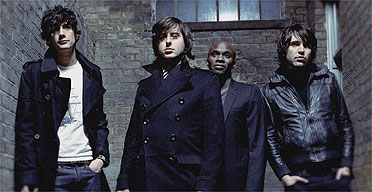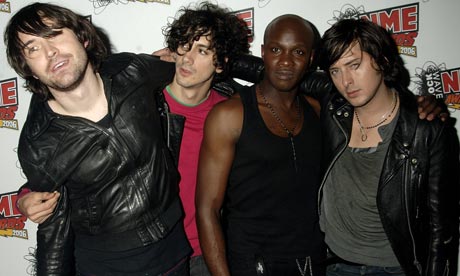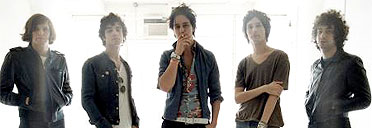There was a time when Carl Barat and Peter Doherty were equal partners. If anything, Barat was slightly more equal than Doherty - Barat was the musician and taught Doherty to play guitar when they formed the Libertines. Together, they were touted as the next great songwriting team. They were punks, they were poets, and if they could only hang around long enough, a great future was predicted for them. Their nihilism was their selling point - here was a band fuelled by genuine anger. They celebrated their fecklessness like there was no tomorrow - and then, after two inspirationally chaotic albums, they split.
We know the sordid details of Doherty's path. He talked himself into crack houses and courthouses and jailhouses and into the headlines with a high-profile relationship with Kate Moss. The lowest point was when he broke into and stole from Barat's flat and ended up in prison for his troubles. When Barat told him he was unfit to tour, Doherty formed a new band, Babyshambles, and put out a record. There were rumours that some of the songs had been co-written by Barat for the Libertines and that he wasn't best pleased. But Barat himself kept quiet.
The Libertines' songs were as furious as they were lyrical, as thrash-happy as they were pub singalongs. They were three-minute Exocets to the heart or boots to the groin - sometimes both. The band saw themselves as troubadours, romantics, angsty dissipated types, losers and scoundrels. They were fixated on an England they referred to as Albion, an England inspired by Blake and the Kinks, village greens, knights and knaves and Arcadia - a vision of paradise that never quite materialised.
If you had listened to the Libertines or read much about them, you might have assumed they were a duo rather than a four-piece. The songs, the stories, the heartbreak all revolved around Barat and Doherty. Of the two, Barat was always regarded as the sensible one, the together one. This turns out to be a simplification. While Doherty may have been more in control of his image than he cared to let on, Barat may have been less in control than he seemed. Since the Libertines split, he has had a tumour on his neck operated on, and has suffered severe depression and writer's block.
In a white-walled studio in north-east London, Barat and his new band, Dirty Pretty Things, are playing at rock stars - all black jeans, shades and tiny rock'n'roll bottoms. Barat is miming guitar for photographs, while drummer Gary Powell (another Libertine stalwart) is trying to catch up on lost sleep, hat rolled over his eyes. Bassist Didz Hammond is checking the lyric sheet for the new album, while guitarist Anthony Rossomando is marvelling at a magazine dedicated to the pursuit of the perfect spa.
Powell lifts his hat from his eyes, and tells me how things have changed. "There's a lot more unity between us as a four-piece than there was beforehand. A lot of the hype created about the Libertines was very much the stance of Pete and Carl together as a unit, and there was undeniably a chemistry between the two of them. But it created a feeling of distance between us. Especially with Pete. He really got off on the fact that the press wanted to talk to him more than they wanted to talk to the others. Carl was like Pete's shadow, and it wasn't really a role he wanted in relation to anyone."
What if Doherty came back and begged to join the new band? "It would take a lot more than that. Take a lot more than that. I still think Pete is a great guy and that he's very talented. I just think he's in a quagmire at the moment."
Piling into a people carrier, we head for nearby Muswell Hill, where half the band live and which, although the Kinks' Davies brothers grew up here, is as un-rock'n'roll as it gets. We pop into a tapas bar, which turns out, in fact, to be a little too rock'n' roll for the band - too loud to talk. So we find ourselves a quieter bar, where Barat warms his hands on a Coke and double Jack Daniel's and orders a burger and chips. He talks quickly, nervously, the way he sings, like somebody who has learned to overcome a stammer.
I ask him if the past year has been awful. "No," he says, "the last year's been good." He gives me an "everything's relative" look. "There's been a lot more clarity in the last year, and a lot less feeling crappy about myself. I'm suddenly starting to feel worthy of life again."
And what about the tumour? That sounded awful. "Oh, it wasn't a cancer thing," he says. He says this quietly, lightly, as if brushing it off, but later he shows me a scar by his ear and down his neck and says the tumour has left him largely deaf in one ear.
If he's relatively good now, when was he at his worst? "Ever since the break-up of the Libertines." It's hard to define this period because by the time the first album was released, the Libertines were already in crisis. If they were nostalgic for anything, it seemed to be for a time before we had heard of them. I ask him whether the good old days were ever any good. "Well, I don't know. The good old days never seem good at the time, do they?" But yes, he says, after umming and aahing, there were good times. "We all set out together, and we were focused and there was this romance." What about? "About the world and everything we saw. We were intrepid, really. Pete wasn't into drugs then."
You were such romantics, weren't you?
He smiles. "We were. We all had our world of wine, women and song and the Artful Dodger and ragamuffinry, and after we got signed that paled into an unreality, even though it was there in spirit and mind and intention."
For so long, he says, they had a clear concept of what they were, even if the rest of the world was oblivious. They were convinced that nobody did what they were doing until the Strokes came along, and played fast, hard hedonistic punk rock, and made a huge success of it. "That did smart a little. And then our band fell apart and we thought, 'If we can't get by doing that, then let's give them a bit of the anger we've really fucking got.'" So the changing cast of the Libertines (Johnny Borrell of Razorlight is a one-time member) changed again.
Had that anger built up over the years? "I think I always had it, actually," Barat replies. "I was just an angry young man in denial."
What was he angry about? "Just the knocks of life, really. I don't really want to go into the personal stuff. I had quite a hard childhood, etc." He comes to a stop. He says he doesn't want to beg for sympathy or turn himself into a victim, and if you look back at anybody's life there's always plenty of stuff to complain about.
Carl Barat grew up on a Basingstoke council estate. His mum was a hippy, his dad was an artist who dabbled in writing and photography. Neither parent did much by way of conventional work. He says he liked to think of himself as self-educated working-class, though he knew it didn't tell the whole story. "My father came from a better class, but through marriage and other tendencies ended up back on a council estate." His father hinted at a glamorous past, suggesting to him that he was related to the actor Basil Rathbone, best known for playing Sherlock Holmes. His mother was a CND activist and took Barat on demonstrations. After a few years as a dosser/artist, his father decided to get himself a job - in an arms factory. Not surprisingly, it caused conflict on the domestic front.
Barat's parents split up, and went on to have more children by other partners. He now has three brothers and three sisters, all but one musicians or actors. He says he is close only to his harpist sister.
Was he happy as a child? "No." He looks at me as if it's one of the daftest questions you could ask. "No, never. I'm not complaining. Everybody's got a sob story." He stops, stubs out his cig and apologises for being "a crabby bastard". He throws back his head and applies drops to a streaming eye. He apologises again - this time for his eye infection.
Why was he so unhappy? "I started taking drugs when I was about 10, and that didn't help. I smoked weed for years and years, which I now attribute to my depression." Did he just spend his time whacked out, doing nothing? "More or less. Just grunting with adolescent friends. I was doing acid at 14. Some people never come back from the first trip."
The funny thing is, he says, he never really liked drugs. His memories are largely of soporific days or verbal diarrhoea or unhappy hallucinations - wanting the acid to end, wanting the mushrooms to end, trying to speak after taking too much speed. Somehow, he managed to leave school with 11 GCSEs. "I did a lot of bongs before my exams. I would have done better if I'd not got wrecked."
Barat went to Brunel University, where he studied drama and befriended Doherty's sister. After two years, he quit the course to form a band with Doherty. University had disappointed him. He had great expectations of meeting a thousand young Werthers, fellow students who felt every thing from the heart, who cherished every emotion and were ready to die for their beliefs. "I went for reasons of romance. I was expecting to meet people who cared passionately about words. But I found none of this, I found hockey sticks and golf clubs. What I actually walked into was a room full of people doing sports science." He dabbled with heroin - and didn't like that much, either. "I was lucky I didn't like it. If I had, I'd be dead without doubt."
Did he find romance? "Yeah, that's why I left early. I met Peter. He's a romancer. And we did have some level of romance." On stage, they shared mics and couldn't have stood closer. At times, they stropped together and canoodled together like lovers. There are plenty of Barat-Doherty sexual fantasies (usually created by fans) strewn across the internet. Was it a physical relationship? He bursts out laughing, and feigns outrage. "Obviously not physical, you mutt. Who d'you write for?" I tell him it's very important to ask tabloid questions when you work for a posh paper. "Well, why not?" he says. "But no, it wasn't physical."
By the time he and Doherty got together, he'd as good as done with drugs and Doherty hadn't even started. These days, he says, he's sticking with the JD - and he orders another double. Doherty is a year younger than Barat. But Barat has always seemed so much older, more mature, and Doherty idolised him. Did he perhaps turn to drugs to emulate Barat - an unwitting and misguided act of hero worship? Barat shakes his head. "No, I don't think so. I think whatever happened he would have done - he must have a lot of demons in his head."
Did he try to dissuade Doherty from drugs? "I tried everything in the book. Everything. Even to the point of joining in, which was a stupid way to go."
Please can we talk about the future rather than the past, he begs. I feel bad - yes, I am interested in Dirty Pretty Things, but everything has been shaped by the Libertines and Doherty, and it would be daft to pretend otherwise. Even now, when you talk about Doherty you do so with such love, I say. "There was a lot of love. Mutually." He looks at his plate. "Quite a burger, isn't it?"
So how hard was it to kick him out of the band? "I never kicked him out of the band," Barat says wearily. "I said to Pete, 'You're in a state, you're not turning up for things, you're doing terrible things, which we won't go into - don't come to play this gig. You've missed half the tour anyway - don't come and play this gig. I don't think you're well enough.' He went nuts, and he wasn't well enough anyway, so we continued without him and the long and short of it is that afterwards I said, 'Don't come and play with us till you sort yourself out.'
He took that as a massive 'up yours', got angry about it and rather than rectify the problems we were talking about he went and formed a band that would put up with his problems so it wouldn't be an issue... I'd rather your article was not so Libertines-heavy, but of course that's for you to decide."
So we change the subject, and I ask him what makes him happiest. "Loyalty and love," he says instantly. Try as I might, the conversation always seems to lead back to Doherty. Did the Libertines betray his trust? "Possibly," he says.
Would you say the biggest betrayal of trust was when your best friend and fellow band member broke into your house and stole from you? " 'Possibly' is the best you're going to get on that one," he says again. "I'm not going to sit here and diss the Libertines. I'm talking about trust and loyalty here, so I'm not going to sit here bitching." There is something so honourable about Barat.
Dirty Pretty Things' album is called Waterloo To Anywhere. The prevailing mood is of somebody who has just escaped a passionate but abusive relationship and is learning to live for himself again. "Maybe it does feel a bit like that, yeah, yeah," Barat says. "I didn't want to write about that, though. I made a point about no specifics, regarding the past."
At times, though, it's hard not to read specifics into the lyrics. The music press has suggested that the song Bang Bang You're Dead is dedicated to Doherty. Barat laughs, and asks why he would do that if he's just spent two years refusing to bitch about Doherty. If he'd wanted to do that, he would have called the song Bang Bang Pete's Dead.
So what is the song about? He looks embarrassed. "It's about me - shooting the Evil Carl and getting on with it." Evil Carl? "Yeah, it sounds a bit schiz, but part of it was that." What's Evil Carl like? "Just a depressive fuck."
How does the depression express itself? "Dejected and indecisive. I just sit there, and everything's wrong, and it really hurts. And not having the will to do anything. Paralysed completely." Petrified? "Yeah, turned to stone."
I ask him what Evil Carl would make of the Carl sitting here tonight. "Evil Carl probably thinks Carl is really hard done by, and should be at home slitting his wrists." Is Evil Carl self-pitying? "Don't do that whole psychiatric thing - you're freaking me out... I imagine so, yeah. Let's have another drink."
So we do, and we talk about the future - that of Dirty Pretty Things and how he'd like to have kids and his obsession with causality and time travel. And he tells me that he's now taking the natural antidepressant St John's wort - three times the recommended dosage naturally - and that it seems to be taking the edge off things, and how he's enjoying the vibe of the new band, and how with a bit of luck he might have finally managed to bury Evil Carl.
What is his favourite song on the album? "It varies from day to day. Currently, Good Carl's having a relationship with Burma." Oh, yes, Burma, I say. I like that one but don't have a clue what it's about. "It's code from the war for Be Upstairs Ready My Angel." Ah, that's so romantic, I say, and we clink glasses. "Yes, it is quite a romantic song," he says, and for a second he sounds almost content.
· Dirty Pretty Things' album Waterloo To Anywhere is out on Mercury on May 8.







